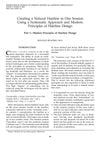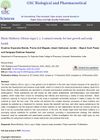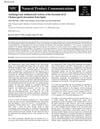The document concludes that current hair loss treatments have limitations and suggests researching new treatments targeting different factors of hair loss.
 55 citations,
July 1999 in “Clinics in Sports Medicine”
55 citations,
July 1999 in “Clinics in Sports Medicine” Athletes use steroids to enhance performance despite health risks and legal issues, and education on their dangers is needed.
1 citations,
September 2023 in “Genes” DNA methylation likely doesn't cause different lambskin patterns in Hu sheep.
2 citations,
April 2020 in “International journal of research in pharmaceutical sciences” Using Malaysian medicinal plants in cosmetics can treat skin and hair issues with fewer side effects than synthetic products.
January 1997 in “Cosmetics and toiletries” A meadowfoam seed oil derivative can penetrate and repair human hair.
 May 2024 in “Current perspectives on medicinal and aromatic plants”
May 2024 in “Current perspectives on medicinal and aromatic plants” Plant-based treatments might help with hair loss and have fewer side effects than synthetic drugs.
 9 citations,
March 2012 in “Experimental dermatology”
9 citations,
March 2012 in “Experimental dermatology” Natural gene therapy shows promise for treating skin disorders like epidermolysis bullosa.
 56 citations,
January 1996 in “Journal of Forensic Sciences”
56 citations,
January 1996 in “Journal of Forensic Sciences” Dye enters hair at the edges of cuticle cells and penetrates more from water than alcohol-based solutions.
 9 citations,
June 2001 in “International Journal of Cosmetic Surgery and Aesthetic Dermatology”
9 citations,
June 2001 in “International Journal of Cosmetic Surgery and Aesthetic Dermatology” A single session hair transplant can create a natural hairline using a detailed technique with specific zones and careful planning.
 1 citations,
December 2022 in “Research Square (Research Square)”
1 citations,
December 2022 in “Research Square (Research Square)” Certain health conditions and hair care habits affect the treatment results for a scalp condition called Central Centrifugal Cicatricial Alopecia.
 1 citations,
February 2022 in “Scholars international journal of traditional and complementary medicine”
1 citations,
February 2022 in “Scholars international journal of traditional and complementary medicine” The herbal hair gel is effective, eco-friendly, and non-irritating with antifungal properties.
 4 citations,
August 2023 in “Materials”
4 citations,
August 2023 in “Materials” New synthetic polymers help improve skin wound healing and can be enhanced by adding natural materials and medicines.
 June 2023 in “Zenodo (CERN European Organization for Nuclear Research)”
June 2023 in “Zenodo (CERN European Organization for Nuclear Research)” Inflammation in hair follicles is a key risk factor for developing common baldness.
 June 2023 in “Research Square (Research Square)”
June 2023 in “Research Square (Research Square)” Different immune responses cause hair loss in scalp diseases, with unique patterns in scalp psoriasis possibly protecting against hair loss.
 November 2024 in “GSC Biological and Pharmaceutical Sciences”
November 2024 in “GSC Biological and Pharmaceutical Sciences” Black mulberry may promote hair growth and improve scalp health.
May 2013 in “International journal of innovative research and development” The document concludes that understanding hair's chemical makeup is key to creating effective hair growth products that also improve social confidence.
 191 citations,
May 2018 in “British journal of dermatology/British journal of dermatology, Supplement”
191 citations,
May 2018 in “British journal of dermatology/British journal of dermatology, Supplement” Alopecia areata is likely an autoimmune disease with unclear triggers, involving various immune cells and molecules, and currently has no cure.
 13 citations,
December 2019 in “Nutrients”
13 citations,
December 2019 in “Nutrients” An apple-based supplement was found to stimulate hair protein production, which may help with hair growth.
 9 citations,
October 2012 in “Natural Product Communications”
9 citations,
October 2012 in “Natural Product Communications” The essential oil from Chamaecyparis lawsoniana has strong antibacterial and antifungal effects, especially against yeast and Gram-positive bacteria.
 16 citations,
November 2019 in “Nanomedicine”
16 citations,
November 2019 in “Nanomedicine” Thermoresponsive nanogels show promise for delivering medicine through the skin but need more safety testing and regulatory approval before clinical use.
 July 2024 in “Natural Product Research”
July 2024 in “Natural Product Research” Nk-EE may help treat hair loss by promoting hair growth and preventing hair follicle damage.
 January 1997 in “프로그램북(구 초록집)”
January 1997 in “프로그램북(구 초록집)” Single hair follicle transplantation is best for restoring eyelashes, eyebrows, and pubic hair, with attention to natural hair direction, thickness, and design.
 January 1993 in “Side effects of drugs annual”
January 1993 in “Side effects of drugs annual” Natural products like propolis are causing more skin allergies, and certain skin treatments and medications have various side effects and risks.
 71 citations,
May 1991 in “Clinical and Experimental Dermatology”
71 citations,
May 1991 in “Clinical and Experimental Dermatology” Young men with male pattern baldness lose hair density over time without treatment.
 8 citations,
November 2019 in “Journal of Natural Fibers”
8 citations,
November 2019 in “Journal of Natural Fibers” Adding human hair to clayey soil makes it stronger, even after freeze-thaw cycles, and is eco-friendly and cheap.
 125 citations,
August 2020 in “Frontiers in Immunology”
125 citations,
August 2020 in “Frontiers in Immunology” Men generally have more severe COVID-19 cases and higher death rates than women due to biological differences.
January 2023 in “International Research Journal of Ayurveda & Yoga” Ayurvedic plant ingredients effectively treat hair problems with fewer side effects.
1 citations,
December 2013 in “The journal of investigative dermatology. Symposium proceedings/The Journal of investigative dermatology symposium proceedings” New treatments and strategies are needed for Alopecia Areata, focusing on immune response and better trial designs.
 41 citations,
July 2015 in “Current Drug Discovery Technologies”
41 citations,
July 2015 in “Current Drug Discovery Technologies” Some plants may help with hair growth and have fewer side effects than synthetic drugs, but more research is needed to confirm their effectiveness.

research Hair
1 citations,
January 2016 in “Springer briefs in molecular science” The document suggests using safer, plant-based hair products instead of harmful synthetic ones.






















